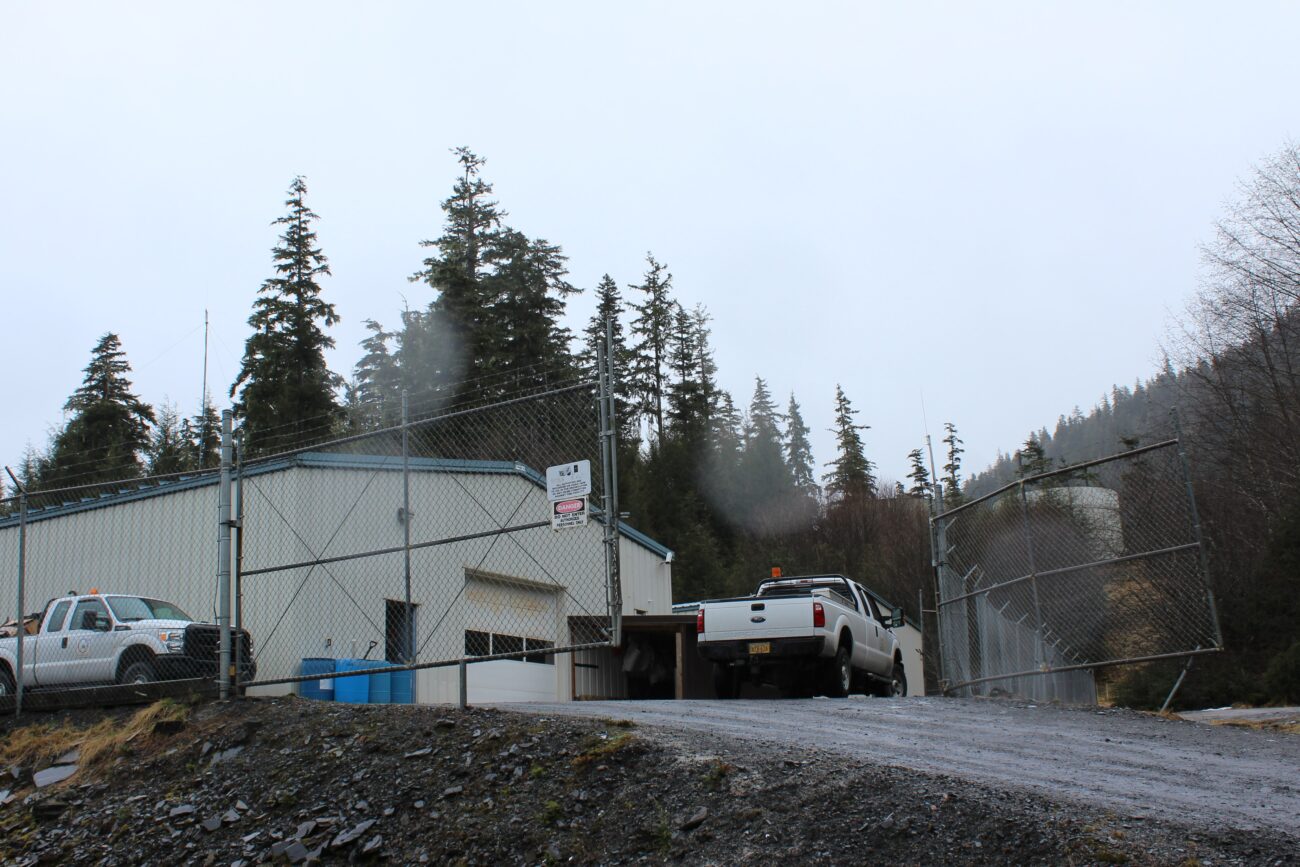
(Sage Smiley / KSTK)
Wrangell’s assembly is considering a 30% water rate increase. Elected leaders say they’re worried the community won’t be able to keep up with its water infrastructure needs, even with households paying an extra $14 a month for water.
As Wrangell gears up to put in a new, $15 million drinking water treatment plant, it also needs to shore up the funds to cover the debt the community will take on.
Last month, elected leaders in Wrangell approved a 21% rate increase for sewer rates – an increase of about $10 per month for a household. That sewer rate increase will set in next week (May 1).
But how much to increase water rates became a sticking point for the assembly.
At the assembly’s April 12 meeting, assembly member Dave Powell said he didn’t want to do the bare minimum with a rate hike, and only raise rates enough to cover the $3.8 million federal loan the borough will take on to help fund the water plant. Wrangell’s utility funds – called enterprise funds – are supposed to be self-sustaining. Right now, they’re not. There’s not enough money to cover all the projects.
“Here we are stuck because we never – as a town, as assemblies that were before us, the administration before us never looked at increases. And now we’re stuck here [raising rates],” Powell said.
For years, Wrangell’s utility rates haven’t kept up with the rising cost of everything else. So Powell proposed a 30% water rate increase, or just over $14 more on a household’s water bill each month.
“We have been pushing this down the road since I’ve been on the assembly and asking for an increase of one penny, two pennies,” Powell said. “I know this is gonna hurt everybody. I do not like to see rates increased. But our rates have not increased. We’ve done rate studies, we have done all kinds of stuff, and here we are trying to do ‘status quo’ on a loan and not going anywhere else. And I’m sorry, people might be mad at me for it, but this is just not good business.”
Wrangell needs to save money for other water-related projects beyond the water plant, like water mains replacements, Powell said. Mayor Steve Prysunka agreed. Plus, the mayor said many community members have benefitted from lower-than-average rates for decades.
“I haven’t been receiving any increased bills for 25 years, basically, so I have had the benefit of socking that money away,” Prysunka said. “That’s where I’m coming from – I’ve been able to save money on my water bill and on my electric bills and on all these bills for 25 years.”
Powell also told fellow assembly members that he wants the government to have more accountability for evaluating rates each year.
“We need to be responsible enough to look at it – or the assembly that is next – be responsible and listen to the people out here that are sitting in that audience saying, ‘Hey, we have to raise the rates to get to where we [need to be],” Powell said, “And right now they’re telling us that and if you ask me, I don’t feel that we’re listening to our enterprise funds.”
Assembly member Patty Gilbert expressed concern about the overall financial climate of residents with rising interest rates and other recent rate increases.
“I feel for the community because we not only have to look at the health of our enterprise funds, but we have to look at the health of the financial climate of our community,” Gilbert said.
If water rates are going to bump up 30%, Gilbert said, something else should give, or at least be increased at a lower year-over-year rate.
“The only thing that the rate payer can modify in their household is their electricity use, all these other rates are fixed,” Gilbert explained. “And I don’t know what the average increase in property taxes was. […] But I am just concerned about the economic picture for the community. I really feel for some households.”
Borough finance director Mason Villarma told KSTK in an interview that no matter what rate increase the assembly approves, one conclusion is that the government and administration need to be looking at the health of the community’s self-sustaining utility funds each year.
“I think the main key here is, regardless of what happens, rates need to be addressed every single year, so it’s not a shock, and there’s no ‘rip off the Band-Aid’ true-up to the community,” Villarma says.
From the finance department’s point of view, if the borough assembly passes a 30% rate increase Tuesday (April 26), Villarma says he’ll be modeling out future rate increases that are much smaller – just to keep up with inflation, basically, “Until I have some other indication or a better reason that an assembly member gives us to project otherwise,” Villarma continues. “So I think that can generally be the community’s view on things.”
Villarma says that all of the recent rate increases, code changes and investment policy updates are meant to put Wrangell on more solid ground for future planning.
“If one of our enterprise funds isn’t profitable it doesn’t make my job very easy because I can’t really model out negative profit, and [say] ‘Here’s what expenditures we’re going to address in the future,’” Villarma explains. “[These rate increases give] us the tools to say, ‘Okay, we’ve got a plan, our plan is to be profitable, our plan is to invest in the community, then here’s how it’s going to flow.’”
With that financial clarity, Villarma says that the assembly, borough manager and department heads will be able to manage the borough more effectively, with a long-term plan. Villarma says he hopes that community members will see rate increases as an investment in the community’s financial future for years to come.
Wrangell’s assembly will hold a public hearing at 6 p.m. Tuesday (April 26) on the proposed rate increase. Sign up to speak at the meeting on the sign-up sheet at City Hall. Letters can also be submitted in person at City Hall or by email to clerk@wrangell.com.
Get in touch with KSTK at news@kstk.org or (907) 874-2345.












